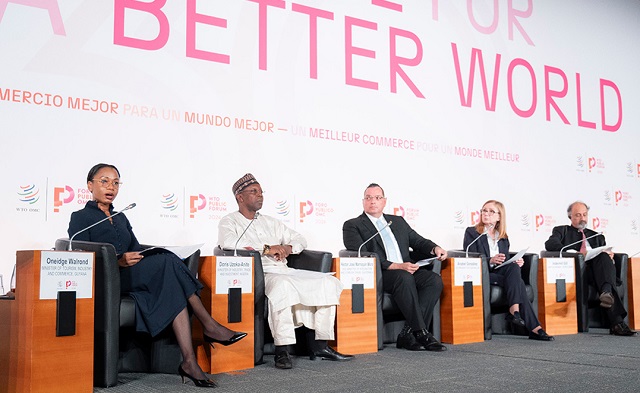El Foro Público se centra en el papel que desempeñan las normas de la OMC en la promoción de los objetivos de desarrollo
En el tercer día del Foro Público 2024 de la OMC se examinó cómo las economías en desarrollo pueden optimizar los Acuerdos.

12 de septiembre del 2024.- En una mesa redonda celebrada el tercer día del Foro Público 2024 de la OMC se examinó cómo las economías en desarrollo y los países menos adelantados (PMA) pueden optimizar las flexibilidades previstas en los Acuerdos de la OMC para impulsar la prosperidad económica a través del comercio. Los debates se centraron en particular en la participación de estas economías en el comercio de productos agropecuarios y textiles, así como en el comercio electrónico.
Nigeria’s WTO Ambassador, Laouali Labo, said that Africa could highly benefit from the WTO agreements’ special and differential treatment provisions to strengthen its digital trade footprint. Through tailored technical assistance and capacity-building programmes, African governments could scale-up their skillsets and work towards lessening the gap in digital connectivity and digital infrastructure with the rest of the world. Ambassador Labo stressed that increasing technology transfer would help make Africa’s digitalization programmes more effective.
Guyana’s Minister of Tourism, Industry and Commerce, Oneidge Walrond, said the 2024 Investment Act and other governmental initiatives are supporting farmers in reaching new regional and global markets. Emphasizing the unique challenges they face, she said that developing economies would highly benefit from greater fairness, predictability and transparency in global markets, helping them to gain better access to critical food and to build resilient food systems. Special and differential treatment provisions covering non-tariff barriers, innovation and fostering stronger support would help the most vulnerable countries recover from economic and climate-induced crises.
Guatemala’s Vice Minister of Integration and Foreign Trade, Héctor José Marroquín Mora, highlighted the important role that special and differential treatment provisions play in helping increase trade opportunities in the textiles sector. Particularly useful methods to help Guatemala diversify production are technical assistance and transition periods to comply with technical standards in addition to technology transfer. Minister Marroquín Mora also underlined the importance of special provisions in the WTO’s Trade Facilitation Agreement, which seeks to expedite the movement, release and clearance of goods.
The World Bank’s Chief Economist, Indermit Gill, said WTO members’ classification system needs to be more granular to better tailor to the special and differential treatment needs of each member economy. Presenting the 2024 World Development Report, he said that the prospects for middle-income economies to shift to high-income status are shrinking, particularly given the current context of increased fragmentation and climate change. More sophisticated policies are needed, focusing on production and competitiveness, higher social and economic mobility and energy transition, he said.
WTO Director-General Ngozi Okonjo-Iweala stated: «The three Bretton Woods institutions must keep working together towards greater coherence. By reconnecting, we can better serve the world to solve global issues. Historically, when jobs were lost, we needed governments to have active labour market policies – trade alone could not bring solutions.»
More information about the session is available here.
More information on special and differential treatment is available here.
Economic case for inclusivity
In a high-level session, UN Trade and Development (UNCTAD) Secretary-General Rebeca Grynspan and WTO Director-General Ngozi Okonjo-Iweala exchanged views on making the economic case for inclusivity.
They engaged in an informal conversation moderated by Australia’s Permanent Representative, James Baxter, examining the economic necessity of mainstreaming inclusion-promoting policies.
Drawing on each organization’s distinct expertise, the discussion highlighted how inclusive strategies can boost productivity, spur economic growth and promote sustainable development. Government representatives, NGOs, businesses and academia contributed diverse perspectives on the transformative power of inclusivity in building resilient, equitable global economies.















